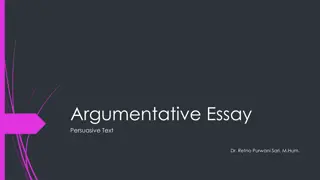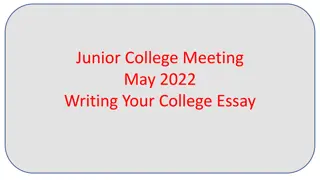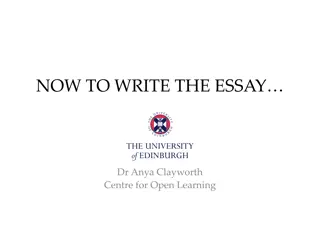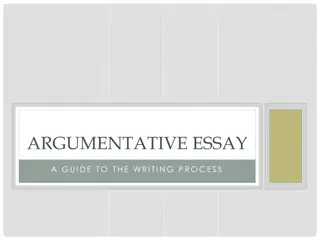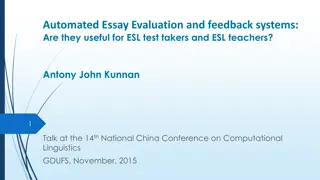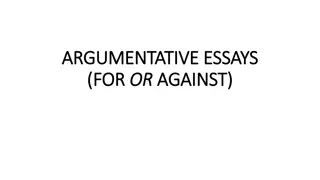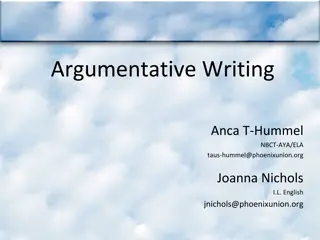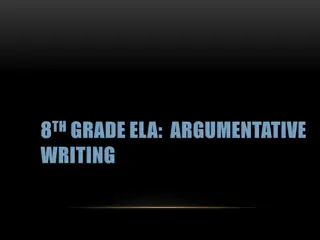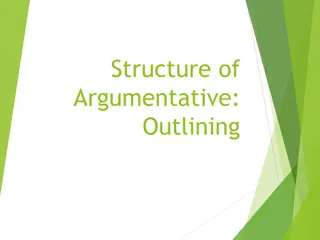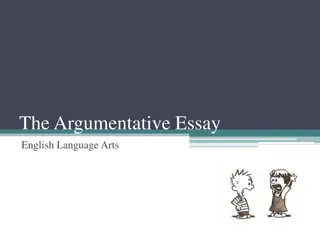
1965 Selma to Montgomery March: Exemplifying Peaceful Protest & Demanding Change
The 1965 Selma to Montgomery March played a pivotal role in demanding voting rights and an end to racial discrimination through peaceful protest. This historical event showcased the power of nonviolent approaches in effecting change, leading to the Voting Rights Act of 1965. Learn about its origins, leadership, and the impact of peaceful demonstrations in this expository and argumentative essay analysis.
Uploaded on | 0 Views
Download Presentation

Please find below an Image/Link to download the presentation.
The content on the website is provided AS IS for your information and personal use only. It may not be sold, licensed, or shared on other websites without obtaining consent from the author. If you encounter any issues during the download, it is possible that the publisher has removed the file from their server.
You are allowed to download the files provided on this website for personal or commercial use, subject to the condition that they are used lawfully. All files are the property of their respective owners.
The content on the website is provided AS IS for your information and personal use only. It may not be sold, licensed, or shared on other websites without obtaining consent from the author.
E N D
Presentation Transcript
THE MARCH OF 1965 Selma To Montgomery Lea Gjurgjaj
Selma to Montgomery March, served as the first steps in history that demanded a future free of segregation and racial discrimination. A protest designed to display that all Americans, no matter their skin color, have the right to vote. This March has been remembered and discussed throughout history for its peaceful approach Led to the Voting Rights Act of 1965 which made it illegal for racial discrimination against voters.
Expository Essay THESIS Through the history of its origins, its leaders reputation and connections and the nonviolent approach the protesters took, the march exemplified that no matter the risk or the opposition racial discrimination in voting isn t tolerated.
Argumentative Essay THESIS Through the history of its origins, its leaders reputation and the nonviolent approach the protesters took, the march of 1965 exemplified that no matter the risk or the resistance, peaceful protests are successful in delivering the necessary message and demanding change.
Argumentative Essay Expository Essay The history of the origins of the 1965 Selma to Montgomery March roots back to racial segregation, discrimination and countless attempts of African Americans to fight the unjust system created by white men. The right to peaceful protest is much desired and inspirational to some citizens, however to others it is an indirect threat of morals, a call to change the ordinary. To others,peaceful protests are ineffective because in many cases they tend to turn violent. Leaders that had a reputation for effective speeches, protests and methods to end racial discrimination, were the ones determined to take action and seek federal enforcement of voting rights. The power of executing the first amendment right peacefully and constantly is what triggers the opposing side to turn violent. Such response proves that the peaceful protest is in fact effectively delivering the necessary message to the public, whether they decide to be part of the movement or not. The Selma-to-Montgomery march, however, was not simply the product of inspiring leadership but also of the commitment of the civil rights community and its example to progressive change.
WORKS CITED Astor, M. Why Protest Movements Are Civil Only in Retrospect. The New York Times. Jun. 2020. Print. Brown, Bryan. "Selma: how the Selma-to-Montgomery marches 50 years ago helped end discrimination against black voters." New York Times Upfront, vol. 147, no. 9, 23 Feb. 2015. Print. Garrow, David J. Protest at Selma: Martin Luther King, Jr., and the Voting Rights Act of 1965. Yale University Press, 2015. Print. Krotoszynski, Ronald J., Jr. "Celebrating Selma: the importance of context in public forum analysis." Yale Law Journal, vol. 104, no. 6, Apr. 1995, pp. 1411-1440. Print. Mwamba, Jay. Civil rights movement, led by Martin Luther King Jr., spread across U.S. toAfrica, Europe. Daily News. Feb. 2017. Print Santoro, Wayne A. "The civil rights movement and the right to vote: black protest, segregationist violence and the audience." Social Forces, vol. 86, no. 4, 2008. Print. Sherman, Amy. "FACT-CHECKING CLAIMS ABOUT SELMA AND VOTING RIGHTS ACT." Tampa Bay Times [St. Petersburg, FL], 6 Mar. 2015. Paper.


